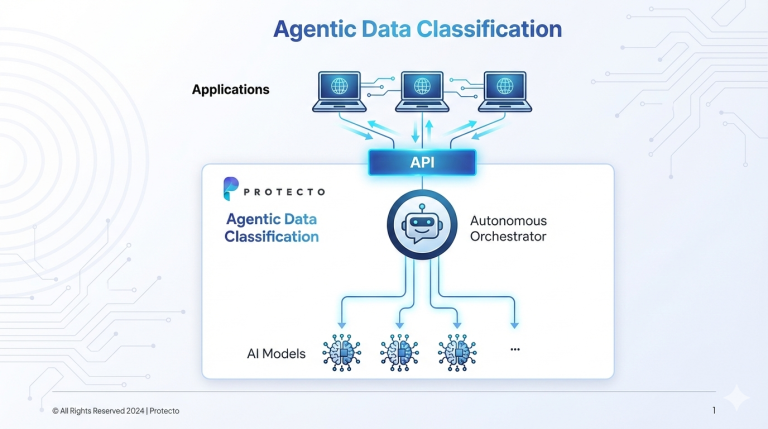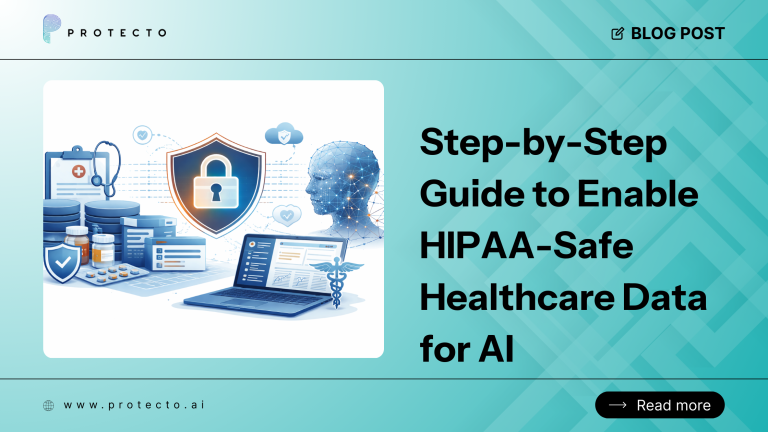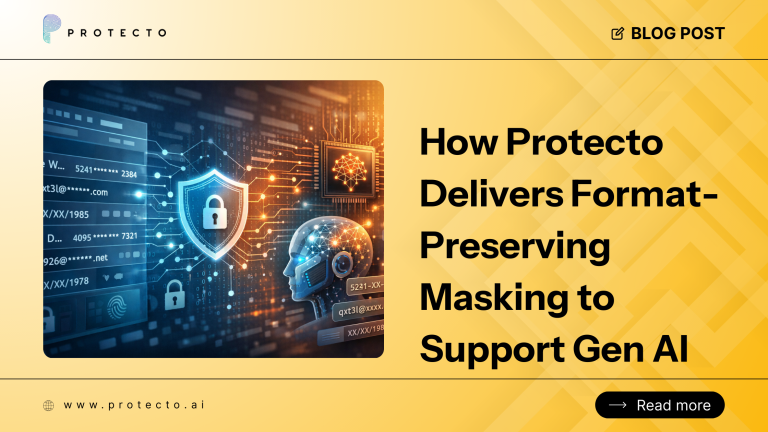Healthcare data security protects patient records from cyber threats and unauthorized access. The increasing use of electronic health records raises concerns about data breaches. Organizations must follow strict security protocols to ensure patient safety and regulatory compliance.
Healthcare data security is more critical than ever as healthcare systems integrate more digital tools. As risks grow, security measures become increasingly essential. Cybercriminals continuously evolve their strategies, making it crucial for healthcare providers to adopt proactive data security solutions. With new technologies emerging, organizations must stay ahead by implementing robust security frameworks and continuously updating their defenses.
The Importance of Data Security in Healthcare
Protecting Patient Data
Data security in healthcare ensures confidential records remain safe. Leaked patient information can lead to identity theft, fraud, and legal issues. The loss of medical data may also compromise patient care, leading to incorrect treatments or misdiagnoses. Digital records improve accessibility and increase the risk of unauthorized exposure, making strong protection measures necessary.
Consequences of Data Breaches
Cyberattacks result in financial losses, reputational damage, and legal consequences. Strong security measures help reduce risks. Healthcare organizations that fail to protect medical data security face costly lawsuits, regulatory fines, and a decline in patient trust. Large-scale breaches can disrupt healthcare operations, delaying treatments and endangering patient lives. The financial implications extend beyond fines, including lost business and expensive remediation efforts.
Interested Read: Secure Patient Privacy Even in Unstructured Data
Ensuring Trust and Efficiency
Patients rely on healthcare providers to keep records secure. Healthcare data security builds confidence and ensures smooth medical operations. Secure systems help healthcare staff access critical patient information without fear of breaches, improving overall efficiency. Trustworthy security protocols reduce the administrative burden associated with data management while enhancing the quality of care delivery.
Interested Read: How to Secure AI and Protect Patient Data Leaks
Key Challenges in Healthcare Data Security and Protection
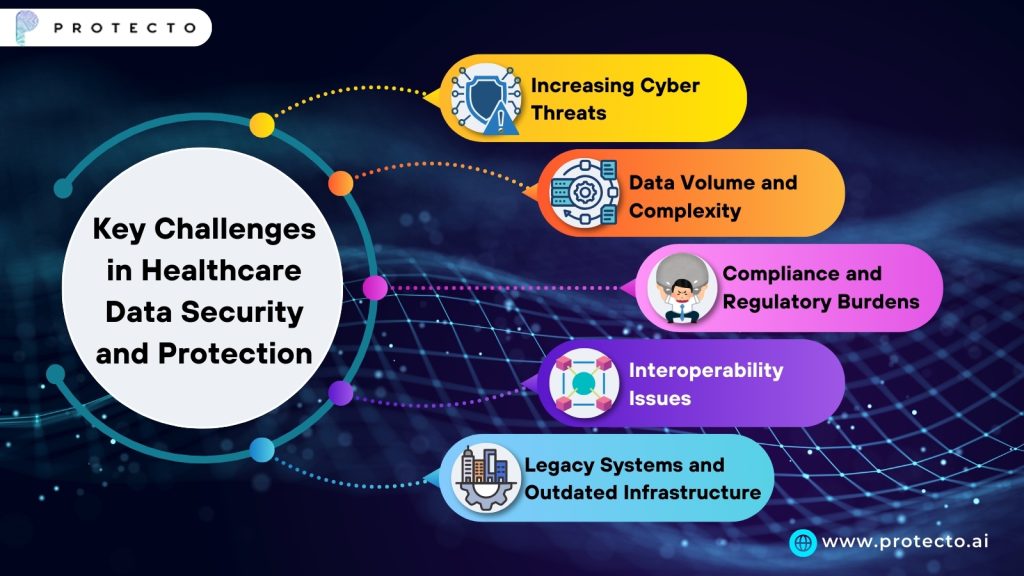
Increasing Cyber Threats
Ransomware, phishing, and insider threats pose risks to patient data security. Attackers exploit system vulnerabilities to steal information. The healthcare industry has become a prime target due to the high value of patient data on black markets. Cybercriminals use sophisticated methods, including AI-powered attacks, making traditional security defenses insufficient.
Data Volume and Complexity
Managing large datasets across multiple platforms increases security risks. Strong medical data security measures are needed to prevent breaches. Healthcare institutions handle extensive records that require secure storage, transmission, and access control. The complexity of data flows between various healthcare providers and insurers further amplifies security concerns.
Compliance and Regulatory Burdens
Healthcare providers must comply with HIPAA, GDPR, and HITECH. Healthcare data compliance ensures data protection and avoids penalties. Frequent updates to regulations require continuous monitoring and adaptation to avoid compliance violations. Non-compliance can result in severe legal consequences, financial penalties, and reputational damage.
Interoperability Issues
Secure data sharing between hospitals, labs, and insurers remains a challenge. Strong security measures ensure the protection of healthcare data while maintaining accessibility. Without proper encryption and authentication protocols, patient records become vulnerable to breaches during exchanges. Ensuring seamless yet secure interoperability is vital for enhancing collaborative patient care.
Legacy Systems and Outdated Infrastructure
Older healthcare IT systems lack modern security features. Regular updates and strong healthcare data security standards help prevent breaches. Many institutions still rely on outdated hardware and software, creating weak points that attackers exploit. Transitioning from legacy systems to modern, cloud-based infrastructures presents security and operational challenges but is necessary for long-term protection.
Interested Read: Protecting PHI in Unstructured Medical Text
Best Practices for Protecting Healthcare Data
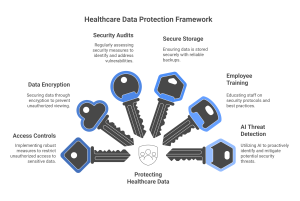
Implementing Strong Access Controls
Role-based access controls (RBAC) and multi-factor authentication (MFA) enhance protecting patient data. Limiting access to only authorized personnel significantly reduces risks. Continuous monitoring of access logs can help detect and mitigate unauthorized attempts.
Encrypting Medical Data
Encryption secures records in transit and storage. Standards like AES-256 and TLS 1.2+ improve medical data security. Without encryption, sensitive patient records remain exposed to cyber threats. Implementing advanced encryption techniques ensures that data remains inaccessible to unauthorized parties, even if intercepted.
Conducting Regular Security Audits & Risk Assessments
Identifying vulnerabilities through compliance audits strengthens healthcare data security best practices. Frequent security reviews help detect potential breaches before they occur. Regular risk assessments ensure that new threats are addressed promptly, minimizing exposure.
Ensuring Secure Data Storage & Backups
Automated backups prevent data loss. Cloud and on-premise storage options enhance data protection in healthcare. Secure backup systems ensure organizations recover data after cyber incidents or hardware failures. Immutable backup solutions add an extra layer of protection against ransomware attacks.
Employee Training and Awareness Programs
Human error causes many breaches. Regular cybersecurity training supports healthcare data protection. Employees must recognize phishing attempts and follow security protocols to avoid exposing sensitive data. Educating staff about the latest cyber threats helps prevent accidental data leaks.
Using AI & Automation for Threat Detection
AI-driven monitoring detects real-time anomalies, improving data privacy and security in healthcare. Machine learning algorithms help predict and prevent cyber threats before they escalate. Automated threat intelligence platforms provide proactive defense mechanisms, reducing the response time to potential attacks.
Interested Read: Securing Patient Privacy: Techniques for De-identifying Healthcare Data
Healthcare Data Compliance Standards & Regulations Guide
HIPAA
The Health Insurance Portability and Accountability Act sets strict healthcare data compliance rules for patient privacy. Organizations must follow HIPAA guidelines to avoid legal and financial penalties.
GDPR
The General Data Protection Regulation ensures strong healthcare data protection for EU patients. Non-compliance leads to severe fines and loss of public trust. Organizations handling EU patient data must implement GDPR-compliant security measures.
HITECH Act
This regulation strengthens data security in healthcare by enhancing HIPAA rules. It encourages better cybersecurity infrastructure and breach notification policies. Healthcare organizations must adhere to strict reporting guidelines to remain compliant.
ISO 27001 & NIST Cybersecurity Framework
These frameworks provide best practices for healthcare data security standards. They guide organizations in implementing strong data security measures. Adopting these standards ensures a well-structured security posture.
Future Trends in Healthcare Data Protection
Zero Trust Architecture (ZTA)
Identity-based access controls reduce security risks. Healthcare data security best practices now focus on continuous authentication. Organizations verify every access request before granting permissions.
Blockchain for Secure Medical Records
Blockchain enhances protecting healthcare data with tamper-proof digital ledgers. The decentralized structure ensures patient data remains secure and immutable. Blockchain adoption is growing as a trusted method for data integrity.
Federated Learning & Privacy-Preserving AI
AI-driven solutions analyze healthcare data securely while maintaining patient data security. These technologies allow researchers to utilize data without compromising privacy. Privacy-enhancing AI techniques continue to evolve to meet stringent security requirements.
Conclusion
Healthcare data security is critical for patient safety, regulatory compliance, and trust. Organizations must adopt strict security measures to protect records. Secure infrastructure, AI-driven solutions, and regulatory adherence improve data privacy and security in healthcare.
Protecto provides advanced data security solutions to help organizations maintain compliance and safeguard patient information effectively. As threats evolve, prioritizing security remains the key to ensuring safe and efficient healthcare operations.

